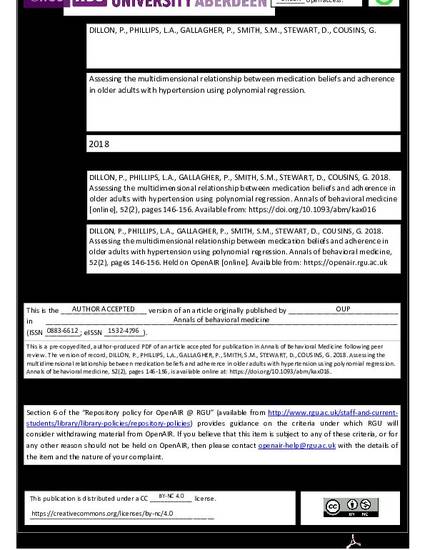
Background: The Necessity–Concerns Framework (NCF) is a multidimensional theory describing the relationship between patients’ positive and negative evaluations of their medication which interplay to influence adherence. Most studies evaluating the NCF have failed to account for the multidimensional nature of the theory, placing the separate dimensions of medication “necessity beliefs” and “concerns” onto a single dimension (e.g., the Beliefs about Medicines Questionnaire–difference score model).
Purpose: To assess the multidimensional effect of patient medication beliefs (concerns and necessity beliefs) on medication adherence using polynomial regression with response surface analysis.
Methods: Community-dwelling older adults >65 years (n = 1,211) presenting their own prescription for antihypertensive medication to 106 community pharmacies in the Republic of Ireland rated their concerns and necessity beliefs to antihypertensive medications at baseline and their adherence to antihypertensive medication at 12 months via structured telephone interview.
Results: Confirmatory polynomial regression found the difference-score model to be inaccurate; subsequent exploratory analysis identified a quadratic model to be the best-fitting polynomial model. Adherence was lowest among those with strong medication concerns and weak necessity beliefs, and adherence was greatest for those with weak concerns and strong necessity beliefs (slope β = −0.77, p
Conclusion: Results extend evidence supporting the use of polynomial regression to assess the multidimensional effect of medication beliefs on adherence.
Available at: http://works.bepress.com/lalison-phillips/22/

This is a pre-copyedited, author-produced version of an article accepted for publication in Annals of Behavioral Medicine following peer review. The version of record: Dillon, Paul, L. Alison Phillips, Paul Gallagher, Susan M. Smith, Derek Stewart, and Gráinne Cousins. "Assessing the multidimensional relationship between medication beliefs and adherence in older adults with hypertension using polynomial regression." Annals of Behavioral Medicine 52, no. 2 (2018): 146-156. is available online at DOI: 10.1093/abm/kax016. Posted with permission.